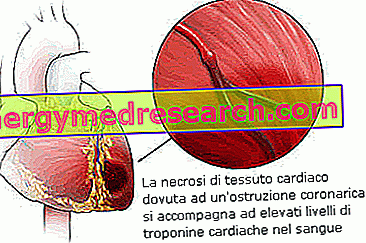Generality
Troponins are proteic enzymes present in skeletal and cardiac muscle; at this level, they regulate muscle contraction, controlling the calcium-mediated interaction of actin and myosin.

For this reason, the troponin test is useful to support the diagnosis of heart attack and other cardiac problems of an inflammatory or ischemic nature.
What's this
Troponin is a key protein for muscle contraction (the mechanism by which it acts is amply illustrated in this article dedicated to the interaction between actin and myosin).
Cardiac troponins are particular isoforms present exclusively in cardiac myocytes. Therefore, their increase in serum unequivocally testifies to an increased release by myocardial tissue, which in turn suggests the presence of a cardiac damage or at least an important suffering of the heart .
Types of troponin
Within the myocyte, troponins are found predominantly in bound form (troponin complex), but a small part also exists in a cytoplasmic free form.
The troponin complex consists of three subunits:
- TnC ( Troponin C );
- TnT ( Troponin T );
- TnI ( Troponin I ).
Of these, only TnI and TnT are specific isoforms for cardiomyocytes and are released into the bloodstream only after certain damage (eg myocardial infarction, ischemia, inflammatory processes, exposure to toxicants or trauma).

Why do you measure
The measure of the troponin allows to understand if the patient has had a heart attack or another cardiac damage . This value is detected through a simple blood test and is considered one of the most important diagnostic references for assessing the health of the heart.
When the patient has suffered a heart attack, the concentrations of TnI and TnT (cardio-specific troponins) increase within 3-4 hours from the damage and can remain high for 10-14 days. Furthermore, the test measures the specific troponin levels of the heart, which are not affected by skeletal muscle damage; for this reason injections, accidents and drugs do not affect the concentrations of the parameter.
The troponin test also allows us to evaluate a possible worsening of angina pectoris (clinical syndrome due to episodes of transient myocardial ischemia and characterized by accessory chest pain).
This test can be prescribed together with other cardiac biomarkers (such as CK-MB or myoglobin) and the electrocardiogram.
When a heart attack is suspected, the dose of troponin is the test of choice for the following reasons:
- Troponin is a more specific indicator for cardiac diseases than other parameters, which may increase in the blood even after a skeletal muscle damage;
- The value of cardio-specific troponins remains high for long periods of time.
When is the exam prescribed?
The determination of troponin is indicated when the patient has signs and symptoms due to a heart attack, such as:
- Chest pain (most frequent manifestation) or sense of oppression;
- Shortness of breath and / or breathing difficulties;
- Accelerated beat;
- Fatigue;
- Nausea or vomiting;
- Cold sweats;
- dizziness;
- Pain in the back, arms, jaw, neck and / or stomach.
The dosage is performed several times, immediately (as a first exam in the emergency room) and in the hours following the onset of the events.
In patients with angina pectoris, the troponin test can be prescribed when:
- The symptoms worsen and do not tend to resolve with treatment;
- The disorders associated with the condition also occur at rest.
Normal values
The reference values of cardiac troponin are almost close to zero:
- Troponin T: 0.2 mg / l;
- Troponin I: 0.1 mg / l.
Troponin High - Causes
Cardiovascular causes
Cardiac troponin levels rise in the presence of:
- Heart attack;
- Cardiac ischemia;
- Angina pectoris;
- Inflammatory heart disease;
- Coronary thrombotic events;
- Taking cardiotoxic drugs;
- Hypertensive cardiopathies;
- Severe tachycardia.
Other cardiovascular causes of high troponin include:
- arrhythmias;
- Heart failure;
- myocarditis;
- Aortic dissection;
- Cardiac surgery.
Extra-cardiac causes
The presence of high levels of troponins in the blood is also associated with extra-cardiac causes, such as:
- Hypothyroidism;
- Hypertension and pulmonary embolism;
- Stroke;
- Preeclampsia;
- Septic shock;
- Hepatic cirrhosis;
- Severe anemia;
- Serious renal dysfunction;
- Respiratory failure;
- Neurological emergencies (cerebral hemorrhage, stroke, seizures);
- Toxic (carbon monoxide and some chemotherapeutic drugs);
- Autoimmunity (post-transplant organ rejection);
- Trauma.
It must be said, however, that many of these conditions also have important repercussions at cardiac level, which justifies the rise of such sensitive and specific markers. Even a particularly intense physical effort, such as that to which marathon runners or triathletes are subjected, can be accompanied by a significant rise in cardiac troponins in serum.
Cardiac Damage Marker
The plasma value of cardiac troponin in normal subjects is almost equal to zero. In the case of myocardial infarction, Troponin T (one of the three subunits that make up the troponin) begins to increase in serum after a few hours, reaches maximum values around the eighteenth hour from the onset of pain and remains elevated up to about 14 days.
Faced with a cardiac pain of unknown cause, the dosage of cardiac troponin in serum (troponin T or I depending on the laboratories), therefore helps to establish the presence or absence of cardiac damage. However, the interpretation of myocardial ischemia markers values (myoglobin, CK-MB and cardiac troponins) must be conducted by carefully and globally evaluating the entire anamnestic-clinical and instrumental context.
Low Troponin - Causes
The finding of a low level of cardiac troponins indicates the unlikely infarction and / or heart damage. In the body of a healthy individual, troponin values are almost zero.
How to measure it
The dosage of troponin is carried out on a blood sample taken from a vein in the arm.
The parameter is measured 2-3 times in a period of time ranging from 12 to 16 hours from the onset of chest pain or other symptoms associated with a heart attack.
Preparation
Generally, no preparation by the patient is required. Troponin may increase following intense exercise, but in the absence of signs and symptoms of heart disease, it has no clinical significance.
Interpretation of Results
- Normal troponin values in a series of successive measurements, spaced by a few hours, are indicative of the improbability of cardiac distress. This makes it possible to exclude that the disorders manifested by the patient can be attributed to pathological events related to the heart. Therefore, the causes must be sought elsewhere, with further diagnostic tests.
Elevation of cardiac troponin levels reflects various degrees of transient or permanent myocardial cell damage:
- If the concentrations of the parameter are significantly high and the increase is found in a series of tests done at different times, then it is likely that the patient has had a heart attack or other heart damage . Concentrations of troponin can become high in the blood within 3-4 hours of the episode and remain so for 10-14 days.
- In patients with angina, an increase in troponin may indicate that the condition is getting worse.
Troponin concentrations may also increase following other conditions such as:
- Myocarditis (cardiac inflammation);
- Cardiomyopathy (weakening of the heart);
- Congestive heart failure;
- Serious infections;
- Kidney diseases.



